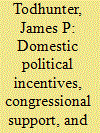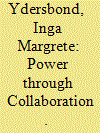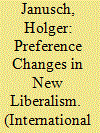|
|
|
Sort Order |
|
|
|
Items / Page
|
|
|
|
|
|
|
| Srl | Item |
| 1 |
ID:
160867


|
|
|
|
|
| Summary/Abstract |
Developing powers are able to influence the evolution of the liberal order. In their multilateral engagements, they can employ a variety of foreign policy and negotiation strategies, voice their preferences and strengthen their bargaining power. This study examines how developing powers interact with the principles and norms of multilateral regimes. It analyzes Brazil’s behavior and negotiation power in the climate change and peace and security regimes. More specifically, it focuses on two concepts recently asserted by Brazil: ‘concentric circles’ and ‘responsibility while protecting.’ While the former addresses the division of responsibilities in the climate change realm, the latter approaches the norm of responsibility to protect. A comparative analysis is conducted with respect to three explanatory indicators, two domestic and one structural. One of the conclusions is that Brazil has behaved in such a way as to uphold a legalistic stance towards the global order.
|
|
|
|
|
|
|
|
|
|
|
|
|
|
|
|
| 2 |
ID:
160864


|
|
|
|
|
| Summary/Abstract |
Powerful states have numerous resources that can be mobilized in mediation processes. However, evidence suggests that such states are not more likely to be successful than other mediators. This article examines U.S. mediations through the lens of foreign policy decision making and argues that leaders make foreign policy decisions primarily with their domestic consequences in mind. Further, it contends that presidential administrations seek to build a record of success in order to improve their domestic political fortunes based on the policy options available to them. The study tests two explanations of foreign policy substitution based on domestic conditions and institutional configurations, the “party cover” and “policy availability” arguments, for U.S. mediations from 1945–1999. Results for the party cover argument are more robust, suggesting that domestic conditions play an important role in the decision to engage in mediation and imply that successful mediation is secondary to domestic politics.
|
|
|
|
|
|
|
|
|
|
|
|
|
|
|
|
| 3 |
ID:
160870


|
|
|
|
|
| Summary/Abstract |
Culture is a significant factor in peace negotiation processes. It frames the parties’ perspectives and strategies to managing the conflict. This study explores the role of culture in the peace negotiation processes of the Dagbon ethnopolitical conflict of Northern Ghana. Twelve elders from the Dagbon Traditional Area with an in-depth understanding of the traditions and culture of Dagbon were interviewed using an unstructured interview guide. Similar to most findings on cross-cultural negotiation processes in high-context cultures, all the negotiators were men. The issues negotiated were largely based on the culture and traditions of Dagbon, and the interest and priorities of the negotiators were culturally defined. As with many other ethnopolitical conflicts, the culture of Dagbon was key in shaping the process and outcome of the peace negotiations. It is imperative for cultural issues to be properly understood and addressed satisfactorily in order not to undermine peace negotiation processes.
|
|
|
|
|
|
|
|
|
|
|
|
|
|
|
|
| 4 |
ID:
160865


|
|
|
|
|
| Summary/Abstract |
Humanitarian actors seeking to offer assistance and protection to civilians in many contemporary conflicts negotiate access with armed groups from a position of weakness. They consequently concede many of their demands, compromising humanitarian operations and principles, and leaving millions of vulnerable civilians beyond reach. Using a structural analysis of the negotiation process in many recent humanitarian crises this article demonstrates the basis of this marked power asymmetry and challenges the assumption in much of the literature that this power imbalance is immutable. Humanitarian negotiators have access to a range of tactics that can alter the structure of the negotiation to reach more favorable outcomes. This article argues that these strategies have proved effective in many recent negotiations, but also carry significant risks to humanitarian actors and to the civilians they seek to assist.
|
|
|
|
|
|
|
|
|
|
|
|
|
|
|
|
| 5 |
ID:
160869


|
|
|
|
|
| Summary/Abstract |
Who gets what in high-level European Union (EU) negotiations and how? This study draws on data concerning stakeholder preferences during heated negotiations leading to the EU’s 2030 Climate and Energy Policy Framework. It tests the explanatory values of Liberal Intergovernmentalism (LI), the Advocacy Coalition Framework (ACF), and Historical Institutionalism (HI). Large member states were key (LI). However, coordinated groups of member states, bound by specific common interests, also played crucial roles. ACF explains the 2030 Framework only if: a) the decisive coalitions consisted of the EU’s supranational institutions, the coordinated groups of member states and long-term advocacy coalitions in the interest group community; b) coalition members held comparatively similar views; and c) coalition members adjusted their strategies mutually and/or shared information. The European Commission set the agenda (HI). The analysis demonstrates that LI, HI and ACF may be used as complementary analytical tools, filling several of each other’s gaps.
|
|
|
|
|
|
|
|
|
|
|
|
|
|
|
|
| 6 |
ID:
160866


|
|
|
|
|
| Summary/Abstract |
In classical two-level games, international cooperation is less likely when there is large programmatic distance and smaller domestic win-sets as a result of changing preferences. The US trade negotiations with South Korea and Colombia question this hypothesis and emphasize two empirical insights that can be integrated into the two-level game to improve its explanatory power. First, smaller win-sets due to preference changes can mitigate conflicts of distribution and make cooperation more likely if the negotiators are aware of the smaller win-sets. Second, when negotiators perceive the already achieved bargaining results as a new status quo, former positive sum games can transform into zero sum games, which makes cooperation more difficult, irrespective of the size of the win-sets. Negotiators who perceive conflicts as zero sum games will put more effort into avoiding losses and, as a result, domestic constraints cannot be used as bargaining levers vis-à-vis a foreign country.
|
|
|
|
|
|
|
|
|
|
|
|
|
|
|
|
| 7 |
ID:
160868


|
|
|
|
|
| Summary/Abstract |
Justice is of central importance in international environmental negotiations. Key characteristics of this type of negotiation augment the complexities of justice issues and warrant a customized approach. Based on a discussion of these characteristics, the article derives four components that are central to a more comprehensive theoretical framework for analyzing justice in environmental negotiations: 1) going beyond narrow self-interest, 2) extending the notion of reciprocity, 3) linking backward- and forward-orientation, and 4) connecting process and outcome. The usefulness of the framework is illustrated by applying it to two important Conferences of the Parties (COP) under the United Nations Framework Convention on Climate Change – COP15 in Copenhagen and COP21 in Paris – which are compared. The framework is suited for a systematic analysis of the complex role played by justice issues in international environmental negotiation, as a key avenue for addressing global threats emerging from anthropogenic environmental change.
|
|
|
|
|
|
|
|
|
|
|
|
|
|
|
|
|
|
|
|
|